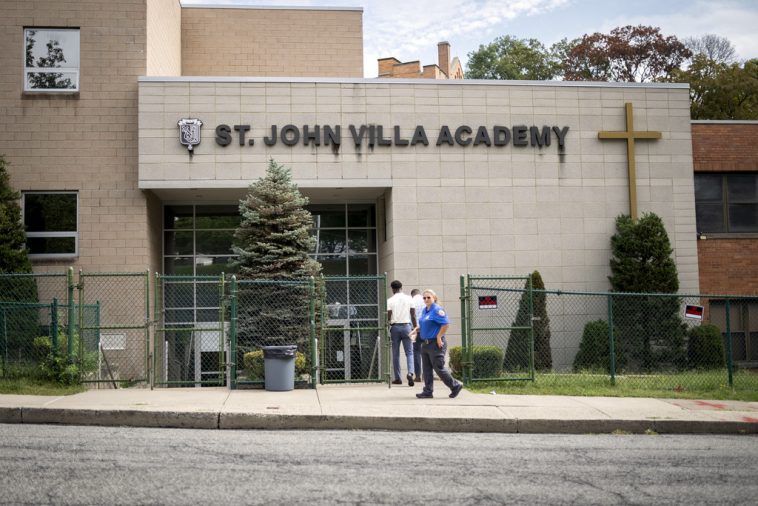A sentiment resonates loud and clear from Staten Island — a deep suspicion over the imposed decisions of the current political leadership regarding migrant relocation. Nicole Malliotakis, the Republican Representative for Staten Island, strongly denounced Queens Borough President Donovan Richards on Monday. This came after Richards hinted that Staten Island has not absorbed a proportionate number of migrants.
Malliotakis attributed Richards’ grievances solely back to him, arguing over the fact that his borough is burdened enormously with the migrant relocation issue — as it hosts 36% of the taxpayer-funded settlements for these newcomers — because he backed the ‘sanctuary city’ policies. Meanwhile, Richards dared to imply that Staten Island should step up and embrace more relocated migrants.
Offering a rebuttal to Richards, Malliotakis raised significant questions about who should be held responsible for the negative effects of certain policies. She asserted, ‘Staten Island citizens did not elect the current mayor, the governor, or the president and hence shouldn’t be obligated to tolerate their impractical policies’ – a clear reflection of Staten Island’s political leanings.
Fully entrenched in her stance, Malliotakis continued her critique: ‘He embraced them all wholeheartedly and is now voicing his discontent about the predicament their policies have created.’ She further highlighted that Donovan still has the chance to criticize Biden’s migrant-friendly policies, recognize the right to shelter in NYC, and express regret for voting with Bill de Blasio in favor of expanding sanctuary cities.
Despite being the subject of Malliotakis’s criticism, Richards in return accused the congresswoman, and by extension Republicans, for the border quandary. ‘Her allies – the governors of Texas and Florida – are the ones forwarding migrants to this area’, Richards refuted. He also suggested that the Republican camp, including Malliotakis, should have endorsed this year’s proposed ‘bipartisan’ immigration reform aiming to reinforce the border ‘instead of abiding by Donald Trump’s flawed policies’.
Richards expressed dissatisfaction over the unfair migrant distribution, as Queens currently has more than a third of all city-run shelters dedicated to migrants. He posed a crucial question, ‘Why not Staten Island?’ Perhaps implying the latter’s comparatively lesser burden in handling the migrant issue.
Recent reports indicated a disproportionate influx of migrants into the poorer neighborhoods of the city, with Queens bearing most of the weight. Out of the 193 shelters assigned for about 65,300 migrants managed by the city, 70 are situated in Queens. Among them, Long Island City encompasses 23 government-run shelters making up around 12% of the city’s total, while Jamaica and Briarwood combined account for 20.
Richards maintained his viewpoint against the Republicans and Malliotakis. He argued, once more, that the mishaps at the border could have been circumvented had there been support for the ‘bipartisan’ immigration legislation introduced earlier in the year, meant to bolster the border, instead of clinging to the previous administration’s policies.
Since spring 2022, City Hall reports indicate that over 203,900 migrants have arrived in the Big Apple, with an average of about 1,100 additional arrivals each week as of June 16. It is an indisputable fact: migration numbers are on the rise, leading to visible strain in New York city’s neighbourhoods.
Staten Island, recognized for its dominant Republican voter base, has consistently defended its standpoint against the wave of migrants that has engulfed the five boroughs. The borough maintains the narrative that it isn’t responsible for the decision-making processes of the present-day political leadership, and hence, shouldn’t bear the brunt of their flawed policies.
The issue at hand doesn’t only relate to politics and power dynamics but has also sparked an important debate about fairness, representation, and the principles of democratic distribution. This debate goes beyond party lines and ultimately affects the lives of countless innocent individuals who are forced to flee their homes.
As the city continues to grapple with this issue, it’s clear that a balance must be struck between addressing the immediate urgent humanitarian needs of the migrants and maintaining harmony and stability within the city’s neighborhoods. Both Queens and Staten Island, regardless of the political divide they represent, are part of the same city and face related challenges.
However, a key argument is, whether those municipalities that endorsed the existent policies should bear the main burden or whether it should be spread across the districts evenly, regardless of initial political affiliations? This question offers food for thought and brings forth the complexities that intertwine politics and humanitarian crises in contemporary society.
On one hand, we see the exacerbated distribution, which causes strain on certain neighborhoods, potentially creating social and economic tension. On the other hand, the demands of human rights and the requirement to provide adequate support to those seeking a better life must be recognized and addressed. This debate encapsulates the delicate balance political leaders must strike when negotiating immigration and relocation policies.
Going into the future, the response to the migrant crisis will undoubtedly continue to shape, challenge and influence decision-making processes on both a local and national scale. The dialogue between Malliotakis and Richards represents a microcosm of the larger debate that is taking place across America.
The story unfolding in these neighborhoods of New York City is not an isolated event; it’s a significant part of a critical national dialogue. One can only hope for a solution that harmonizes with the principles of democracy, embraces the essence of humanity, and stays true to the obligations of elected leadership.


